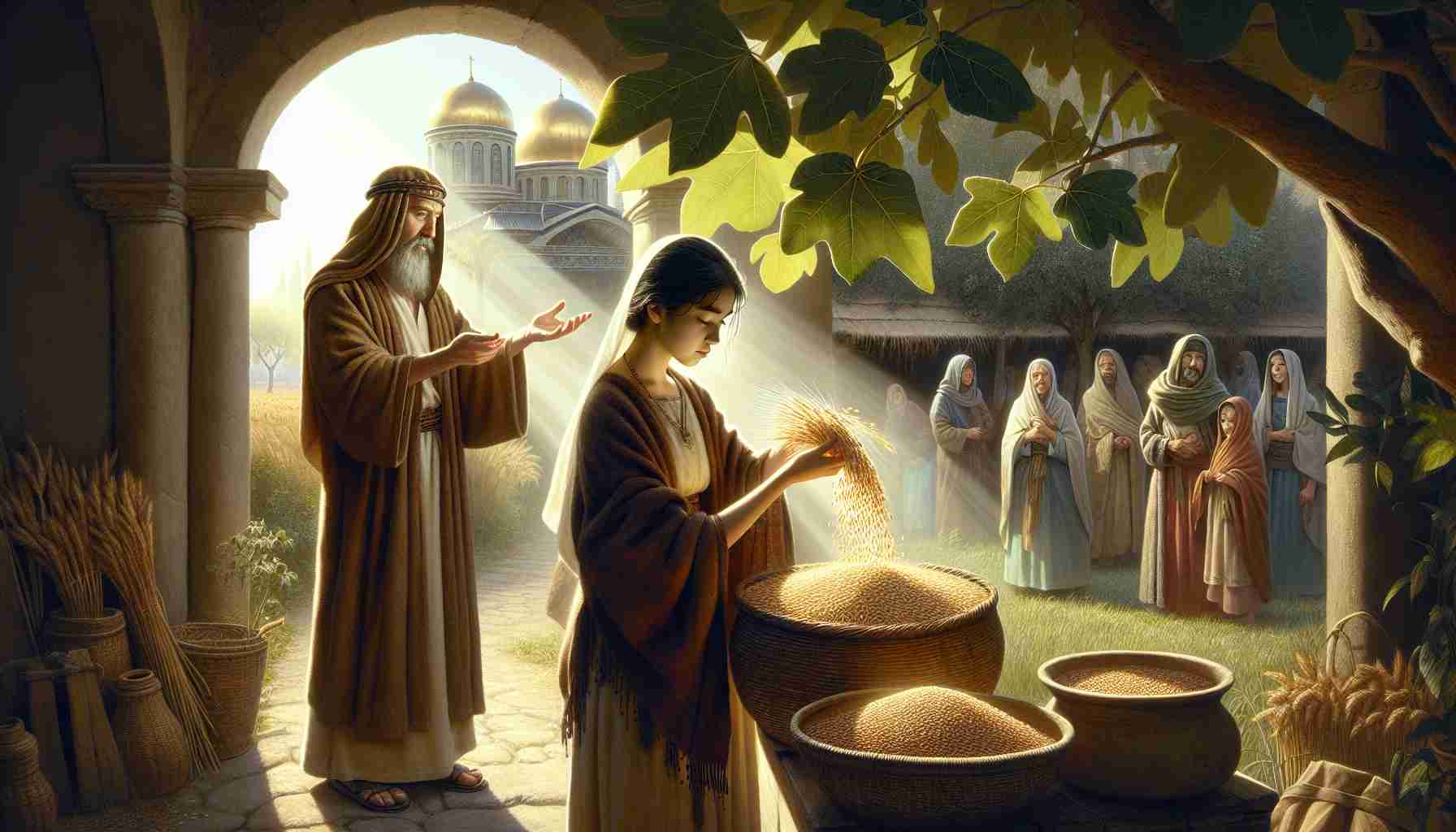

They had finished building the canopy where the marriage blessings would be spoken, and I was brushing dust from my sleeves when I saw her again—Ruth, standing in the sunlight with her head bowed low. I was just a worker at the threshing floor, barely known, but on that day, I stood close enough to witness something holy.
Boaz had become more than my master. Over the years, I had grown to respect him not just for his leadership but for his heart. He was a man of standing in Bethlehem, a land once full of sorrow from famine but now blooming again. And Ruth—she was the Moabite widow who came with Naomi from Moab, leaving behind her own people to cling to our customs and our G-d. Most in town whispered about her, called her foreign or strange. But Boaz saw something different.
I remember the day he told me of his plan. "There is another closer in line to redeem her," Boaz said, gripping the edge of a barley sack. "But if he won’t, I will. Not just to guard Naomi’s family line, but because she is worthy. She is kind. She is brave."
In our law, a relative could redeem—take responsibility for—a widow to preserve the name of the deceased. It meant marrying her, if needed, and raising children in the name of her late husband. Boaz did not have to do it. But he wanted to.
The next morning, he went to the town gate. I stood in the crowd, watching as Boaz met the other man, the closer kinsman. In front of ten elders, Boaz offered him the chance to redeem Naomi’s land—and Ruth along with it.
The man shook his head. “I cannot risk my own inheritance,” he said, removing his sandal as our custom allowed to show he gave up his right.
Boaz turned, his voice calm but full of strength. “Then I will redeem her,” he said. “I will take Ruth, the Moabite widow, as my wife, to raise the name of the dead over his inheritance.”
I do not know what came over me, but in that moment, I felt pride. Not for myself, but for him. For what it meant that our people—our laws and kindness—could welcome someone like Ruth into our fold.
When the ceremony began, I saw joy upon Ruth's face. Not bold joy, but quiet and deep, like the earth after rain. Naomi stood nearby, smiling with eyes full of hope I had not seen in her since she returned from Moab.
That day, a widow from a foreign land was embraced not just by a man, but by an entire people. And though we didn’t know it yet, the child they would one day have—Obed—would become the grandfather of King David.
Sometimes, redemption doesn’t come in fire or miracle. Sometimes, it walks in kindness, honors the law, and plants the seed of a future only God could have written.
They had finished building the canopy where the marriage blessings would be spoken, and I was brushing dust from my sleeves when I saw her again—Ruth, standing in the sunlight with her head bowed low. I was just a worker at the threshing floor, barely known, but on that day, I stood close enough to witness something holy.
Boaz had become more than my master. Over the years, I had grown to respect him not just for his leadership but for his heart. He was a man of standing in Bethlehem, a land once full of sorrow from famine but now blooming again. And Ruth—she was the Moabite widow who came with Naomi from Moab, leaving behind her own people to cling to our customs and our G-d. Most in town whispered about her, called her foreign or strange. But Boaz saw something different.
I remember the day he told me of his plan. "There is another closer in line to redeem her," Boaz said, gripping the edge of a barley sack. "But if he won’t, I will. Not just to guard Naomi’s family line, but because she is worthy. She is kind. She is brave."
In our law, a relative could redeem—take responsibility for—a widow to preserve the name of the deceased. It meant marrying her, if needed, and raising children in the name of her late husband. Boaz did not have to do it. But he wanted to.
The next morning, he went to the town gate. I stood in the crowd, watching as Boaz met the other man, the closer kinsman. In front of ten elders, Boaz offered him the chance to redeem Naomi’s land—and Ruth along with it.
The man shook his head. “I cannot risk my own inheritance,” he said, removing his sandal as our custom allowed to show he gave up his right.
Boaz turned, his voice calm but full of strength. “Then I will redeem her,” he said. “I will take Ruth, the Moabite widow, as my wife, to raise the name of the dead over his inheritance.”
I do not know what came over me, but in that moment, I felt pride. Not for myself, but for him. For what it meant that our people—our laws and kindness—could welcome someone like Ruth into our fold.
When the ceremony began, I saw joy upon Ruth's face. Not bold joy, but quiet and deep, like the earth after rain. Naomi stood nearby, smiling with eyes full of hope I had not seen in her since she returned from Moab.
That day, a widow from a foreign land was embraced not just by a man, but by an entire people. And though we didn’t know it yet, the child they would one day have—Obed—would become the grandfather of King David.
Sometimes, redemption doesn’t come in fire or miracle. Sometimes, it walks in kindness, honors the law, and plants the seed of a future only God could have written.